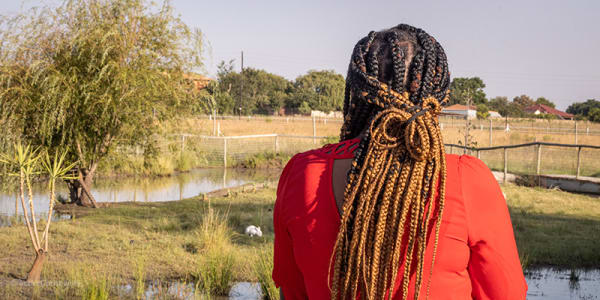All life comes from God; He is light, and in Him is no darkness at all. (1 John 1:5.) Satan is the opposite of God and he lives in darkness and sin. From the beginning God made it clear that sin will lead to death. (Genesis 2:17; Romans 6:23.)
Sin separates us from God
When Satan deceived Eve, and afterwards got Adam to disobey God, sin came into their nature. This sin came between them and God like a heavy curtain or barrier, separating them from God who is the source of life. Spiritually speaking, they were dead because of their disobedience and sins. (Ephesians 2:1.) Sin had come into the world, therefore the world was cursed, and all living creatures also had to die a physical death.
The sin that came into Adam and Eve’s nature was passed on to all their children and future generations. This “sin in our nature”, which is also called “sin in our flesh”, is a strong desire to do our own will rather than God’s will. We are not guilty for that. But if we give in to this desire, if we give in when we are tempted, we do sin, and for that we are guilty. To help His people do His will, God gave them laws that made His will for them very clear.
But people were very weak and no one ever managed to keep himself pure from sin. In fact, even the best of them usually sinned daily in thought, word and deed. In other words, all people were guilty, and Satan could use this to accuse them, demanding that they should die. (Romans 5:12.) In the temple, which is a symbol of the house of God on earth, a large, thick curtain hung in front of the Holiest of Holies. This curtain is a symbol of the sin in people’s nature that separated them from God. Anyone going through that curtain would die immediately, as no sin could stand in the presence of God.
Forgiveness through sacrifice
But God gave people a chance: by sacrificing a healthy animal without defect, the people could get forgiveness. Once a year the high priest could go in the Holiest of Holies, carrying the blood of the sacrifice, and get forgiveness for the people. Through the spilling of the blood of an innocent sacrifice, the debt of sin could be paid. (Leviticus 17:11; Hebrews 9:22.)
But the blood of animals couldn’t take away the real cause of the problem, which is the sin in human nature. After their sins were forgiven, people continued to sin, meaning that they had to come back and sacrifice again, year after year. Not even the high priest could help them; he himself was a sinner, and the sacrifice was both for himself and the people. (Hebrews 10:1-4.)
God hated the bad way that things had developed. His longing was to have fellowship with people and save them. He looked for someone who could lead the people out of the trap of sinning, asking for forgiveness, sinning again etc. But, even though there were righteous, God-fearing people throughout history, none of them were blameless, and none of them could “stand in the gap” between God and mankind. (Ezekiel 22:30.) So then God sent His own Son to carry out this greatest work in history. (Isaiah 41:28; Isaiah 60:16; Isaiah 63:5; John 3:16-17.)
Jesus: a human being in every sense of the word
Jesus was the Son of God, but He willingly gave up His place with God and became the “Son of man” – a human being in every sense of the word, with the same human nature as all of us. This meant that Jesus was tempted as we are. But Jesus was also born of God’s Spirit, and this Spirit was with Him His whole life, giving Him the strength to do the task He was sent for. (Luke 1:30-35; Philippians 2:5-8; Isaiah 61:1-3.)
“He was born as a man and became like a servant. And when he was living as a man, he humbled himself and was fully obedient to God, even when that caused his death—death on a cross.” Philippians 2:7,8 (NCV). It was as a man that Jesus had to learn obedience because, being a man, He had His own self-will, which is the same as having sin in His human nature, and therefore He could be tempted. There He learned to deny Himself, and put that sin to death. (Colossians 3:5.) The result was that He never sinned and was without sin. (Hebrews 2:18; Hebrews 4:15; Hebrews 5:7-8.)
When Jesus spoke out against sin and against the hypocrisy of the religious leaders of the time, He spoke with authority and certainty. But He was misunderstood by nearly all the people who lived during His time. In the end, He was arrested and crucified. The pure, righteous, blameless Man died as a criminal, punished for sins He had never done. Why?
Forgiveness – and a way to follow
Jesus was blameless, the only human being in all history who was completely pure and never sinned. Therefore Jesus was the only one who could “stand in the gap,” the only one on whom Satan had no claim. He was the only one who had not deserved death, either physical or spiritual.
But, fulfilling the purpose for which He had come to earth, Jesus willingly offered Himself. He was crucified as the final, blameless sacrifice. He died as the Lamb of God, paying for the sins for all mankind. He bore the punishment of all our sins, and died, the just for the unjust. (Romans 5:10; 2 Corinthians 5:21; 1 Peter 3:18.) He did not only die a physical death, but He was even separated from God while He was hanging on the cross. (Matthew 27:46; Mark 15:34.) Through this sacrifice, all those who believe in Him can receive forgiveness.
Jesus’ death on the cross on Calvary is one of the most important and powerful events ever on earth, but it is actually only part of the Christian story. When Jesus was born as a human being just like us, He also had a human nature (also called a “flesh”) just like us; therefore He could be tempted to sin.
But by the power of the Spirit that was with Him from birth, Jesus always said No when He was tempted to do the sin that He had in His nature as a human being. This is also called to “suffer in the flesh”. (1 Peter 4:1.) In this way the sin in His human nature was condemned and He “put it to death”. So though He was tempted, He never sinned. He put to death all the sin that lived in His human nature. (Hebrews 2:18; Hebrews 4:16.)
When Jesus died on the cross, He cried out, “It is finished!” At that moment, every last bit of the sin He had inherited in His human nature had been put to death, and His work on earth was finished. When Jesus died, the heavy curtain in the temple, which was the symbol of the sin in people’s human nature that separated them from God, was torn from top to bottom. Jesus had paid the debt for people’s sins; the way back to the Father was open.
Jesus’ victory over sin was also a victory over death. He did not remain in the grave but arose from the dead with a glorified body, in which lived the whole fullness of God’s own nature. Forty days later He ascended to heaven, where He is sitting today at the right side of His Father. (Philippians 2:5-11; Colossians 2:9.)
Jesus’ brothers!
So how was Jesus’ crucifixion and sacrifice different from the sacrifice and forgiveness in the Old Covenant? How does Jesus’ death on the cross take away the sin in our human nature? Why are we still tempted? This is because forgiveness alone was not the final goal of Jesus’ life, nor is it the final goal of a Christian. In fact, forgiveness is only the beginning. Jesus Himself said this very clearly: “All who want to come after me must say no to themselves, take up their cross daily, and follow me.” Luke 9:23 (CEBA).
Jesus’ purpose was not only to be the sacrifice that paid the debt for people’s sins. He wanted disciples, people who follow Him. We can’t follow Him to the death on the cross on Calvary, but we can “take up our cross” daily!
By following Him like this, we become His disciples, and He sends us His Holy Spirit to give us the same power that He had to overcome sin. We also say No to the sin, to all the sinful lusts and desires in our human nature, and put it to death. In this way we also stop doing sin, we become “members of His body,” we become Jesus’ brothers, and we share in godly nature! (1 Peter 4:1-2; Galatians 5:24; Romans 8:13; 1 Corinthians 12:12-14; Hebrews 2:11; 2 Peter 1:2-4.)
Jesus’ death on the cross of Calvary was the end result of His amazing work of love for us people. By His death He restored the relationship with God for those who believe in Him, and through His life He opened a way back to the Father for those who follow Him. Through death over sin, Jesus defeated death. (Hebrews 2:14-15.) By His life He gave us life. May His sacrifice not be for nothing – may He have many disciples, whom He is not ashamed to call His brothers and sisters!




